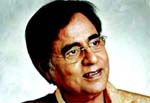 The captivating voice that epitomised the depth of pain, melancholy and yearnings of love will no longer be heard live. Ghazal maestro Jagjit Singh, who suffered a brain haemorrhage 17 days ago, died yesterday morning after being on life support system in Mumbai’s Lilavati Hospital.
The captivating voice that epitomised the depth of pain, melancholy and yearnings of love will no longer be heard live. Ghazal maestro Jagjit Singh, who suffered a brain haemorrhage 17 days ago, died yesterday morning after being on life support system in Mumbai’s Lilavati Hospital.
The 70-year-old singer, whose soulful numbers evoked a range of emotions among millions of hearts, had been in coma ever since he was admitted to hospital on September 23 with brain haemorrhage hours before he was to perform with Ghulam Ali at a concert in Mumbai.
Jagjit Singh, popularly called the “Ghazal King”, is credited with not only reviving the dying genre but also popularising it.
Jagjit Singh’s songs like “Tum itna jo muskara rahe ho” or “Honto se chhoo lo tum/mera geet amar kar do” will continue to reverberate in the hearts of all ages to come.
Songs like ‘Jhuki jhuki si nazar’ and ‘Kaagaz ki kashti’ saw the singer breathing new life in the dying genre of music in 1970s and carving a niche for himself in Bollywood.
Conjuring up hits like ‘yeh zindagi kisi aur ki’, ‘mere naam ka koi aur hai,’ ‘Patta-patta boota-boota haal hamaara jaane hai,’ ‘Tum ko dekha’, ‘Hazaar baar ruke ham and hazaar baar chale’, Singh appeared on the scene and made a mark during the ’70s when the ghazal scene was dominated by well-established names like Noor Jehan, Malika Pukhraj, Begum Akhtar, Talat Mahmood and Mehdi Hassan.
Singh was inspired by singers like Kundan Lal Saigal, Talat Mahmood, Abdul Karim Khan, Bade Ghulam Ali Khan and Amir Khan.
One of the most successful artistes of his time, whose popularity went beyond the borders of India, Jagjit Singh has left behind a huge body of work in a career spanning half a century, including 80 albums.
Jagjit was born in a Sikh family on February 8, 1941 in Sriganganagar district of Rajasthan state to Amar Singh Dhiman, a government employee, and Bachan Kaur. He had four sisters and two brothers and was called Jeet by his family.
His birth name was Jagmohan but his Sikh father rechristened him as Jagjit following the advice of his guru.
It was his father, who first recognised his son’s talent although he had wanted him to be an Indian Administrative Service officer.
He sent a young Jagjit to learn the nuances of music under a blind teacher Pandit Chhaganlal Sharma. He later trained under Ustad Jamal Khan of Sainia gharana for six years and gained knowledge in Khayal, Thumri and Dhrupad forms.
A music composer also, Jagjit Singh has sung in Bangla, Punjabi, Hindi, Urdu, Gujarati, Sindhi and Nepali and was awarded India’s third highest civilian honour, the Padma Bhushan in 2003.
His music became more popular through films like Prem Geet, Arth, Saath Saath and Joggers’Park and TV serials Mirza Ghalib (1988) and Kahkashan (1991).
Among Jagjit Singh’s countless admirers are Indian Prime Minister Manmohan Singh and his wife Gursharan Kaur.
Manmohan Singh paid rich tributes to Jagjit Singh, saying he would be remembered for his “golden voice”.
Noting that he is among Jagjit`s admirers, the Prime Minister said in his condolence message that by “making ghazals accessible to everyone, Jagjit Singh gave joy and pleasure to millions of music lovers in India and abroad….he was blessed with a golden voice
Legendary singer Lata Mangeshkar said Jagjit Singh’s death was a big loss for the music industry. “I knew him well. I hoped he would come out of the coma. But God willed otherwise.”
Asha Bhonsle said hearing Jagjit’s ghazals brought peace to the mind. “Listening to him was a soothing experience. If one wanted to get away from everyday stress, the best way was to play a Jagjit Singh record.”
“I feel sad for his wife Chitra. She lost a son earlier and now husband. She is very lonely now,” Asha said.
Bollywood lyricist Javed Akhtar described Jagjit Singh as an “extraordinary” ghazal singer whose death has caused “an irreparable loss to the Hindi film and music industry”.
“I first heard him when I attended an event in Kanpur named ‘Music Night by Jagjit and Chitra’ while in school. He was an icon. There is nothing I can say to console his wife (Chitra). All I can say is that he will never be forgotten. I pray to God to give her the strength to recover from the loss,” classical vocalist Shubha Mudgal said.
An emotional Usha Uttup recalled her time with Singh. “I can’t believe it. It was because of him that ordinary men could enjoy good ghazal. We worked together in a jingle when I was just starting my career.
-With The Daily Star input



